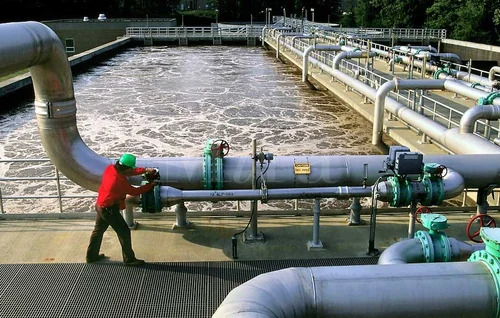Importance of Industry Wastewater Treatment | WOG Group

We employ cutting-edge, green technology in our industrial water filtration system. The WOG Group is an association of academics and professionals who develop Industrial effluent water treatment. After purification, it is safe to release the effluent into nearby bodies of water. The systems ensure the water is pure before we get rid of it without endangering the environment. The array of water filtration systems offered by the WOG Group now includes industrial or home applications. Although, we provide exceptional service to our clients. We continue a research effort that enables our staff to enhance water filtration. The wastewater treatment facility cleans the water, breaks down organic molecules, and removes suspended particles.
Our industrial wastewater treatment system provides a significant competitive advantage over top producers of industrial treatment plants in India. So, we are offering various water treatment options for suitable water filtering methods. The method guarantees there is no damage to the environment or effluent generated. A wastewater treatment facility is necessary to handle industrial wastewater and sewage appropriately. Also, for the correct treatment of sewage & industrial wastewater, wastewater treatment facilities are essential.


Process For Industry Wastewater Treatment
To eliminate pollutants and toxins from the wastewater produced by industrial activities, the process of an industrial wastewater treatment system requires numerous steps. The broad outline of the procedure is as follows:
- Collection and Storage: Wastewater is collected from various sources within the industrial facility & stored in a tank.
- Pre-Treatment: Wastewater will go into preliminary treatment at this stage to remove the big particles & debris using techniques of screening & sedimentation. This action aids in safeguarding the machinery and pipelines further downstream.
- Primary Treatment: The wastewater enters a sedimentation tank or clarifier as the Primary treatment unit. Here, larger particles and suspended solids form a sludge that settles to the bottom while floating substances like oils and greases will skim off the top. Effluent, or partially treated wastewater, advances to the following stage.
- Secondary Treatment: The wastewater undergoes biological treatment when microbes that break down organic debris are added. In an active sludge system or trickling filter, the microorganisms in this process take in organic pollutants and convert them into biomass and gases like carbon dioxide. Firstly, the water has completed the first stage of treatment and is moving on to the second.
- Tertiary Treatment: Tertiary treatment procedures are useful in improving the quality of the effluent. This stage employs advanced processes like filtration, disinfection, chemical precipitation, or membrane filtering to remove any leftover suspended particles, nutrients, pathogens, and trace pollutants.
- Sludge Treatment: The sludge from primary and secondary treatment undergoes various treatment methods to reduce the volume & stabilize it for disposal. Subsequently, sludge digestion, drying, and dewatering are typical techniques.
- Discharge or Reuse: The completed treated wastewater can be discharged into surrounding bodies of water or used for non-potable purposes like irrigation or industrial activities if it meets regulatory requirements or specified reuse conditions.
Importance of Industry Wastewater Treatment
- Sustainability: Industrial wastewater frequently contains a variety of contaminants that, if released into the environment untreated, can be harmful to the ecosystem, including heavy metals, organic compounds, oils, and chemicals. Hence, the effects of these toxins on ecosystems, surface water, groundwater, and soil are reduced or eliminated by treatment.
- Water Conservation: By treating and recycling industrial effluent, water scarcity problems will be reduced. Industries can recycle and reuse water by putting together the proper treatment procedures, which reduces their reliance on freshwater sources and protects this priceless resource.
- Public Health & Safety: Uncontrolled discharge of untreated industrial wastewater poses an imminent risk to public health by contaminating rivers and lakes with water for consumption. The removal of dangerous compounds is ensured by proper treatment, also avoiding potential health risks for neighbouring populations and workers.
- Economic Practices: By encouraging responsible water management & reducing the overall environmental impact of companies, the industrial wastewater treatment system is in line with sustainable development goals. Therefore, it indicates a dedication to social responsibility and environmental stewardship.
- Rules & Laws: Governments implement tight rules & discharge limitations to safeguard the environment & the general public’s health. Industries must treat their wastewater to meet regulatory criteria & acquire permits for the activities. Punishments, legal repercussions, and reputational harm may follow non-compliance. Altogether, there are various laws for environmental protection.
Does industrial waste harm the ecosystem?
Improper management & treatment of industrial waste can harm the environment. Industrial processes often produce effluent containing harmful pollutants such as heavy metals, hazardous chemicals, organic compounds, oils, and solids. Releasing untreated effluent into the environment may have various negative impacts. The wastewater treatment solution is a requirement of all industrial plants.
- Soil Contaminants: Contaminants can seep into the soil when industrial waste is disposed of inappropriately or when spills happen. It will contaminate the soil, reducing its fertility and altering its makeup. Agronomic production reduces & toxins may bioaccumulate in the food chain because of contaminated soil.
- Ecological Unbalance: Industrial waste introduces toxins that can injure or kill plants, animals, and microbes, upsetting the harmony of ecosystems. It may result in a decline in biodiversity, a reduction in habitat quality, & ecological imbalances that have repercussions up and down the food chain.
- Ground Pollution: Groundwater Pollution can occur when industrial waste disposes of inappropriately or spills into groundwater, which serves as the primary source of drinking water for many towns. Groundwater contamination can be difficult and costly to properly clean up, putting public health at risk & rendering the water unfit for human use.
- Air Pollution: Pollutants discharge into the atmosphere because various industrial activities lead to air pollution. It could happen because of chemical reactions, chimney emissions, or volatile material evaporation. Airborne pollutants, harming ecosystems and human health, can worsen issues such as smog formation and climate change.
- Water Pollution: Untreated industrial waste can infect water sources like rivers, lakes, and oceans, which causes water pollution. Pollutants in wastewater can harm aquatic life, alter ecological systems, & deteriorate water quality. Hence, it may have significant effects on fisheries, biodiversity, and the ecosystem as a whole.
The three principal areas are domestic, industrial, and agricultural wastewater. Food, chemicals, paper and pulp, nuclear and thermal power, laundry, medications, mines, iron and steel, and other sectors generate industrial wastewater. Moreover, organic and inorganic components abound in these wastewaters. Excessive release of these nutrients into water causes an increase in minerals and nutrients in bodies of water. It also results in oxygen deficiency. Always ensuring wastewater treatment plants are in place & that waste entering the environment is free of hazardous chemicals is any industry’s most important duty. If not, this harmful discharge will affect the neighbourhood, & the effects of these substances can often be irreversible, resulting in serious harm to the ecology and the local population.






